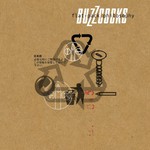Flat-Pack Philosophy
Studio Album by Buzzcocks released in 2006Flat-Pack Philosophy review
Flat-Pack Philosophy squeezes 14 tunes into just 36 minutes
Out of the many band reunions that have taken place over the years since punk burned itself out, the Buzzcocks has proven to be one of the most enduring and least embarrassing. Since 1993, the current incarnation of the band – original vocalists/guitarists Pete Shelley and Steve Diggle and late additions Tony Barber and Phil Barker on bass and drums, respectively – has released five albums and toured regularly. While their first three albums together were hit-or-miss affairs, offering a few examples of the Buzzcocks’ trademark punk-pop masterpieces alongside middle-of-the-road rock, in 2003 they gained critical favor with a hard-driving eponymous effort that recaptured some of the raw power of their early years. Though 2006's Flat-Pack Philosophy isn't haunted by the same degree of angst as that album, it reflects the same degree of increased maturity that informed Shelley and Diggle's material on that collection. Flat-Pack Philosophy largely trades in the darkness and aggression of its predecessor for a poppier, more melodic approach and squeezes 14 tunes into just 36 minutes. Much of the album’s success can be attributed to the production by Tony Barber. The sound he achieves is open, clear, and balanced, bringing equal focus to each instrument and voice. More importantly, though, both Shelley and Diggle have written solid, memorable songs.
The granddaddies of punk still have fire in their bellies
From the get go, Flat-Pack Philosophy is a record that accosts you with its hooky choruses and sharp jagged riffs – opening track Between Heaven And Hell sounding like the results of fired up jam session between Paul Weller and Oasis. It's a similar story on Big Brother Wheels, a blistering slice of melodic guitar pop that leaves you thinking if Noel Gallagher still had the passion and conviction, Oasis may still be able to sound this energized and committed. Credit and Dreamin' may be basically the same tune delivered back to back, but when it's so chock full of attitude and lyrical bite, then who's really going to complain. With its fun guitar licks, infectious chorus, and fast tempo, the title track is probably the band’s best new song since the Thunder of Hearts single from Modern seven years ago. With this track’s opening bars it’s obvious the granddaddies of punk still have fire in their bellies. Guitars are buzzy and distorted courtesy of Steve Diggle and Tony Barber’s bass lines meander all over the place, creating patches of melody on a rugged landscape. Vocals switch from staccato fury to melancholic groove and the whole thing is riddled with short, sharp, quality tunes. The barnstorming Sound of A Gun hits you squarely in the face, a vicious sounding song – all bruising riffs and angry melodies.
The new century is shaping up to be a good one for the Buzzcocks
Since 1977, Buzzcocks' scathing, intelligent lyrics and melodic punk energy have influenced everyone from The Smiths and Nirvana to the modern throwback of Franz Ferdinand. Flat-Pack Philosophy proves that when you put the right creative personalities together, the magic manifests. The Buzzocks are taking an urban guerilla stance against the evils of the modern world from Tesco self-service tills to the cult of Ikea. Fast and loud is still the preferred mode of attack, but though there are hooks galore to be found on Flat-Pack Philosophy, the tempos have eased up a bit so that Diggle's and Shelley's guitar parts have more room to interact with one another. Shelley’s menacing yet melodic snarled vocals alternates with Diggles’ warmer, bassier rock-croon. Naive listeners might lose the smart Flat-Pack Philosophy among like-sounding "The" bands, but those interested in a little bit of punk history would be wise to check this out. Very few bands made better use of their teenage mood swings than the Buzzcocks, but Flat-Pack Philosophy shows that they have plenty of compelling things to say about their adult lives, too, which is a good thing for a band whose career now spans four decades. The new century is shaping up to be a good one for the Buzzcocks. Maybe there are more classic songs to come.

